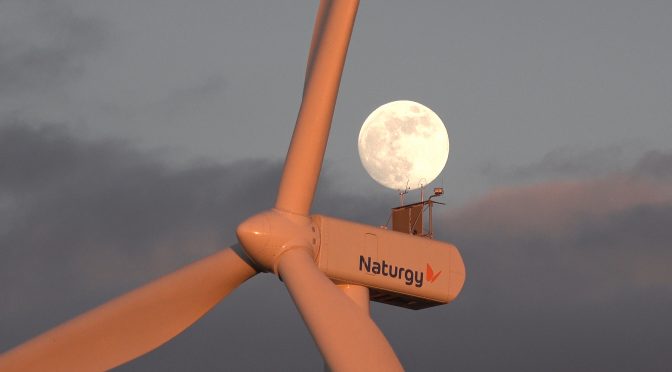The company has nine wind farms in the archipelago, eight in Gran Canaria and one wind farm in Fuerteventura, with a total installed capacity of 45.4 MW.
The wind energy generated by these nine renewable facilities has prevented the emission of 113,645 tons of polluting and greenhouse gases into the atmosphere and has made it possible to displace other sources of electricity generation.
Naturgy currently has nine wind power facilities in operation in the Canary Islands that between January and December 2020 produced 143.71 gigawatt hours (GWh) of energy, which is equivalent to the annual consumption of some 57,484 homes.
Thanks to the energy produced by these nine wind farms over the past year, the use of other sources of conventional electricity generation has been displaced, helping to reduce polluting and greenhouse gas emissions by 113,645 tons.
Of the wind facilities that Naturgy has in operation in the Archipelago, the one that contributed the highest production, 39.8 GWh, was the 12.8 MW Piletas I wind farm located in the municipality of Agüimes. The energy produced by this park is equivalent to the annual consumption of practically 16,000 homes and has prevented the emission of more than 31,530 tons of polluting and greenhouse gases.
The Balcón de Balos wind farm, also located in Agüimes and with an installed capacity of 9.2 MW, produced 33.8 GWh until December 31, 2020, which has allowed 26,800 tons of polluting gases to be avoided into the atmosphere and greenhouse effect. The energy production generated by this park is equivalent to the annual consumption of more than 13,500 homes.
For its part, the only wind farm that the company currently has in operation in Fuerteventura, the Fuerteventura Renovables II wind farm with an installed capacity of 4.7 MW, is located in the municipality of La Oliva and generated almost 8 in 2020. 5 GWh of energy, which is equivalent to the consumption of 3,288 homes and thanks to which it was possible to avoid the emission of 6,500 tons of polluting and greenhouse gases.
Presence in the Canary Islands
In addition to the nine wind farms that the company has in the Autonomous Community, the energy multinational is building a second wind farm in Fuerteventura, the Puerto del Rosario wind farm, with an installed capacity of 29.2 MW and which will involve an investment of 37 million euros. The park will be made up of 8 wind turbines and its annual energy production is expected to be around 105 GWh per year.
The multinational energy company has various renewable energy projects in the administrative process totaling about 120 MW, which confirms the company’s commitment to the Canary Islands.
Bet on the energy transition
Naturgy has been taking decisive steps for years to support the energy transition, moving towards a more sustainable energy mix. At the end of 2020, the company had 4.6 GW in clean technology operation and its strategy for the next few years is focused on continuing to grow in renewable energies. Naturgy plans to invest a minimum of 1,000 million euros in 2021 to develop the acquired renewable electricity generation projects and has identified investment projects worth 2,500 million euros in the coming years in projects to promote renewable gases, betting especially on the renewable hydrogen and biomethane generation.
All this, without abandoning the fundamental objectives such as an industrial strategy to create value and growth for each of the businesses, as well as the ESG objectives. In 2020 Naturgy reduced its greenhouse gas emissions by 7%, in addition to the 16% reduction in 2019. In addition, it reinforced its commitment to sustainability by promoting new social action initiatives [MH1] and advancing its policies of equality and diversity.
The company’s performance in social, environmental and good governance matters has been recognized by the main and most important indices and rankings in the world, among which are the Dow Jones Sustainability Index, FTSE4GOOD or the Carbon Disclosure Project, as well as the European Business Awards for the Environment of the European Commission.


